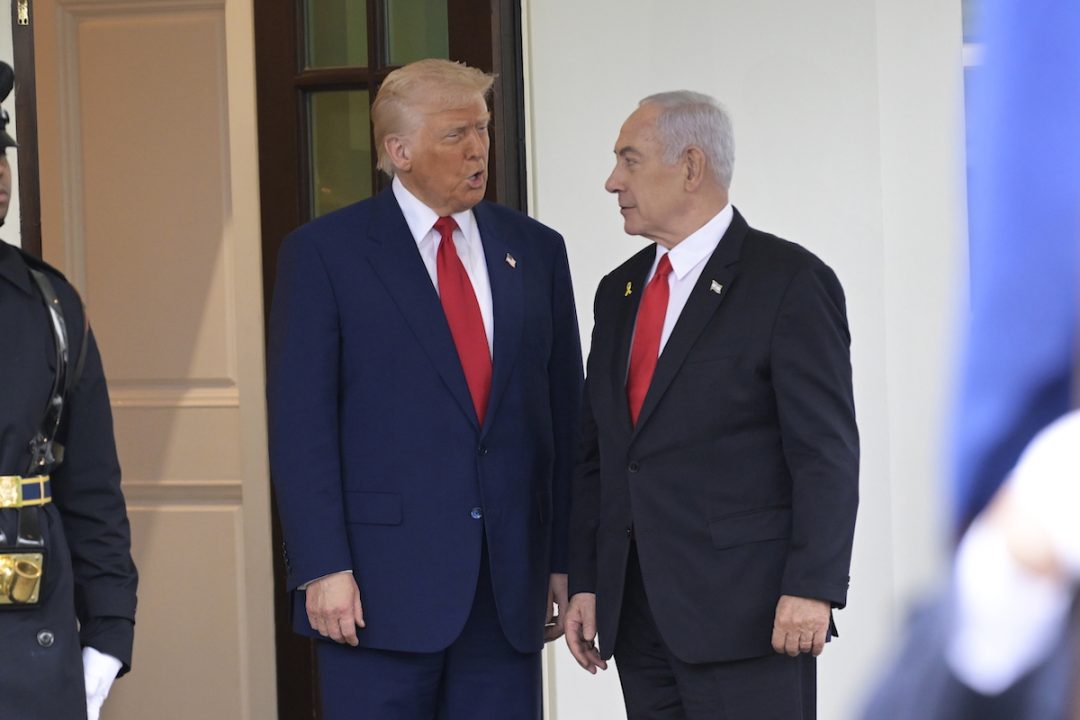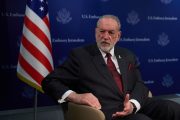
The last American hostage held by Hamas — Edan Alexander — was released without any help from Israel. Steve Witkoff, U.S. special envoy to the Middle East, dealt directly with Hamas through a confidential back channel.
According to reports, a senior Hamas official contacted the former leader of “Arab Americans for Trump,” who then personally negotiated with Witkoff. Once free, Alexander and his mother thanked President Donald Trump — and only Trump. But Witkoff wasn’t as subtle. Fin de Pencier reported for The Spectator:
We want to bring the hostages home, but Israel is not willing to end the war. Israel is prolonging it — despite the fact that we don’t see where else we can go and that an agreement must be reached,” Witkoff told family members of the hostages on Monday, according to Channel 12 television, quoting sources that attended the meeting.
This is one of a series of recent developments suggesting that relations between the United States and long-time ally Israel might be cooling, at least a little, and at least for the time being.
Historical Support
Historically, the United States has lavished near-unconditional support for Israel, the only Middle Eastern nation with Western values. Indeed, modern-day Israel was forged by European Jews in just the last century. The United States was the first country to recognize the state of Israel in 1948. President Harry Truman made the move almost unilaterally, according to U.S. State Department correspondent Tom Bateman.
Among those who advised Truman against recognizing Israel was Secretary of State George Marshall, who served as a general in World War II — someone Truman considered “the greatest living American.” Marshall “vigorously opposed the president immediately recognizing a Jewish state because of his fears about a regional war — and even went as far as telling Truman he would not vote for him in the coming presidential election if he backed recognition,” said Bateman. The CIA and State Department harbored identical concerns of America being drawn into a bloody conflict between Israel and Arab nations.
Nearly 77 years to the day since Israel declared statehood, similar fears are once again circulating through the White House Cabinet. As Israel increases pressure on the United States to take action against Iran, there is concern within the Trump administration that doing so would pull America into another Middle Eastern quagmire.
Does this have anything to do with why Trump’s much ballyhooed Middle East tour this week does not include a stop in Israel?
Deals With the Saudis
On Tuesday, Saudi Arabia lavished Trump with a reception fit for a king. The Saudis rolled out a lavender carpet for the American president, trumpeted his arrival with horns, and flanked his limousine ride to the Royal Court in Riyadh with riders on Arabian horses. Trump, always open to adulation, loved every bit of it.
That same day, the United States struck a $142 billion arms deal with the Saudis. “Nobody makes military equipment like us; the best military equipment, the best missiles, the best rockets, the best everything. Best submarines — by the way, most lethal weapon in the world,” the president said of the deal in typical Trumpian fashion. The Saudi company DataVolt also committed to investing $20 billion in artificial intelligence data centers and energy infrastructure in the United States. In total, “Trump sealed $300 billion in deals with the Saudis, with an eye toward doubling that total within four years,” the Wall Street Journal reported. Prince Mohammed bin Salman had pledged to invest a total of $600 billion in the United States over the next four years after Trump took office.
Reports suggest Trump’s Middle East tour, which also includes stops in the United Arab Emirates (UAE) and Qatar before he returns Friday, is supposed to yield over $1 trillion in investments.
Nuclear Ambitions
But the Americans aren’t the only ones with business acumen. The Saudis want help developing their own nuclear program. And, according to reports, the Trump administration is “very excited” to lend a hand. As The Washington Post noted, a deal like that has implications for America’s rivalry with China:
U.S.-Saudi cooperation in building reactors for nuclear power plants in the kingdom could shut the Chinese and Russians out of what could be a high-dollar partnership for the American nuclear industry.… The feeling is “if the U.S. doesn’t provide it, then someone else will,” said Hasan Alhasan, a senior fellow in Bahrain for the International Institute for Strategic Studies.
Saudi Arabia, a longtime U.S. ally, supports the White House’s goal of keeping Iran from building nuclear weapons. Prince Mohammed said in 2018, “Without a doubt, if Iran developed a nuclear bomb, we would follow suit as soon as possible.” And while Israel obviously opposes Iran acquiring nuclear weapons, the Jewish state likely would not approve of the Saudis having such capabilities.
Abraham Accords
During his address in Saudi Arabia, Trump said he dreamed of having the Saudis join the Abraham Accords, a deal he brokered during his first term that saw relations between Israel and some Gulf countries normalized for the first time. But Mohammed bin Salman has said outright there’s no chance of that happening until the war in Gaza ends and a clear path to Palestinian statehood emerges. As of now, neither of those cards are on the table. Israel recently announced threats to occupy Gaza after Trump’s Middle East tour if Hamas doesn’t agree to its terms.
This is probably why the White House “has dropped the criteria that Saudi Arabia have normal ties with Israel as a condition for moving forward with civilian nuclear cooperation talks,” as reports suggest.
Nevertheless, Israeli officials may be confident that Trump doesn’t have the congressional backing to move ahead with plans to help the Saudis develop a nuclear program. An Israeli official told Israel Hayom that Trump “doesn’t have a Senate majority for any agreement that doesn’t include Israel or that moves forward without its consent.”
Disagreements on Iran
If there is trouble in paradise between these longtime allies, the first sign may have been when the United States shot down an Israeli plan to bomb Iranian nuclear sites. Israel drew up plans to strike Iran in May. “They were prepared to carry them out, and at times were optimistic that the United States would sign off,” according to reports. But in order for the plan to work, U.S. involvement was necessary. Israeli Prime Minister Benjamin Netanyahu had said the plan was to “go in, blow up the facilities, dismantle all the equipment, under American supervision with American execution.”
But a rift had broken out between the more trigger-happy, hawkish Cabinet members and the war-hesitant ones within the Trump administration. Among those who supported Israel’s plan were General Michael E. Kurilla, the head of U.S. Central Command and then-National Security Advisor Michael Waltz. Trump has since removed Waltz from the position. Those who wanted to further exhaust diplomacy with Iran included Director of National Intelligence Tulsi Gabbard, White House Chief of Staff Susie Wiles, Defense Secretary Pete Hegseth, and Vice President J.D. Vance.
For the time being, and between the occasional threats, the Trump administration has chosen to hold off on military action against Iran. It has even stopped bombing the Iran-allied Houthis in Yemen.
Changing Sentiments
Unreserved support for Israel has been a mainstay of the Republican voting block for decades. But that, too, appears to be changing. As Bateman noted, “Between 2022 and 2025, the Pew Research Center found that the proportion of Republicans who said they had unfavorable views of Israel rose from 27% to 37%.”
Israel hasn’t done itself any favors by its lack of restraint in Gaza. It has turned the area into rubble in its attempt to hunt down the remaining terrorists who committed the October 7 attack. There’s no telling how many civilians have died — many say the Palestinian authorities aren’t trustworthy — but the carnage is evident.
For many who’ve traditionally supported Israel, its post-October 7 campaign changed that. Israel is a civilized nation that boasts some of the brightest minds in the world. It has turned the area it took in 1948 into the most advanced in the region. It is held to higher standard than terrorists who rape and kill women and children.
Follow the Founders
But there would be no debate, within any administration, if the United States hadn’t veered so far off the foreign policy path prescribed by America’s Founding Fathers. In his farewell address, George Washington warned that favoring other nations will come at the cost of our own nation’s well-being. He said doing so “gives to ambitious, corrupted or deluded citizens (who devote themselves to the favourite Nation) facility to betray, or sacrifice the interests of their own country, without odium, sometimes even with popularity.” Continued the “Father of America”:
Excessive partiality for one foreign nation and excessive dislike of another, cause those whom they actuate to see danger only on one side, and serve to veil and even second the art of influence on the other.
Washington prescribed a foreign policy in which America strives to live peaceably with all nations — a noninterventionist foreign policy where the United States minds its own business except for legitimate national security interests. The Trump administration would be wise to read Washington’s Farewell Address while ousting any remaining war hawks.





